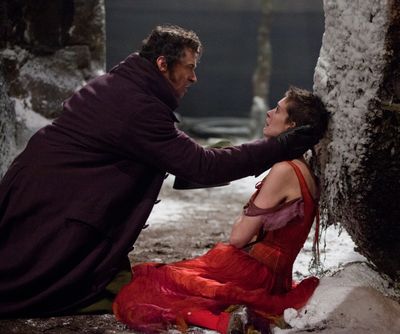‘Les Mis’ remains true to roots

To transform the much-beloved “Les Miserables” from stage to screen, Director Tom Hooper had find a way to maintain and amplify the emotional power of the original words and music with the trappings of a big-screen production.
His efforts have created a beautiful and moving version of the stage production that’s loyal enough to its origins to appease Broadway musical fans, yet is theatrical enough to stand as a feature film release.
“Les Miserables,” the musical based on the book by Victor Hugo, is a story of love, devotion, dedication and betrayal set in the years following the French Revolution. Jean Valjean (Hugh Jackman) emerges from 19 years of hard labor in prison – sent there for stealing a loaf of bread – and begins a new life. His new world of wealth and power is threatened when he’s recognized by Javert (Russell Crowe), a man whose devotion to the letter of the law goes beyond the obsessive.
The honorable Valjean is willing to return to prison because of his parole violation, but he must first complete a promise he makes to a dying Fantine (Anne Hathaway), a young woman from his factory who has turned to a life of prostitution to pay for her daughter’s care. Valjean’s efforts to keep that promise forces him to once again seek a new identity and home. This leads him to a divided Paris poised on the brink of revolution.
Hooper started with one huge advantage. The timeless and powerful story resonates with a conscious-shaking force no matter the medium. In a world where there are no absolutes, two dedicated men strive to protect the purity of their convictions. The always surprisingly versatile Jackman turns in a masterful performance as a man who emerges from a shattered life to become a champion of truth and justice.
Jackman’s expressive face and competent singing voice bring a depth to the role that serves as a centerpiece for telling this dramatic tale.
Crowe’s Javert represents a devotion more to the letter of the law than its spirit. It’s only when he faces the harsh truth that rules have to be treated with a fluidity that he comes face to face with his own demons. Crowe brings a thuggish quality to the role, but his thin voice is often a distraction. Javert’s words should create emotional earthquakes but Crowe’s work is little more than a tremor.
Anne Hathaway is tres magnifique. Hooper was smart enough to know that while the actress might not have the singing skills of those who have played the role on stage, Hathaway’s acting abilities more than make up for any musical deficiencies. Hooper leaves the camera on her face as she sings the show-stopping “I Dreamed a Dream” with such haunting refrain that it makes you think that this must be what it’s like when angels cry.
Some people are given Oscars, others earn them. Hathaway has more than earned a gold statue.
The film is loaded with powerful supporting players, particularly Samantha Barks as the suffering Iponine and Eddie Redmayne as the lovesick Marius.
Hooper gives the actors a stunning backdrop to work against, creating an 19th century Paris that feels so real you can almost smell the sewers and feel the rats running across your feet. It’s these sweeping vistas that justify making the stage musical into a film.
There are a few small problems, such as the staging of the “Master of the House” scene that feels more like a Tim Burton production-possibly because of the casting of Helena Bonham Carter. From a cinematic point of view, it feels out of place.
And, it’s hard to get past Crowe’s crooning.
Overall, Hooper has taken the stage play and elevated it visually to counterbalance the weaker voices. The combination of the powerful story and his beautiful vision makes “Les Miserables” a winner.
One word of warning. If you aren’t a fan of the musical, “Les Miserables” is very operatic in design with almost every line of dialogue sung. If you revolt at the idea of that style, then another holiday selection should be made.